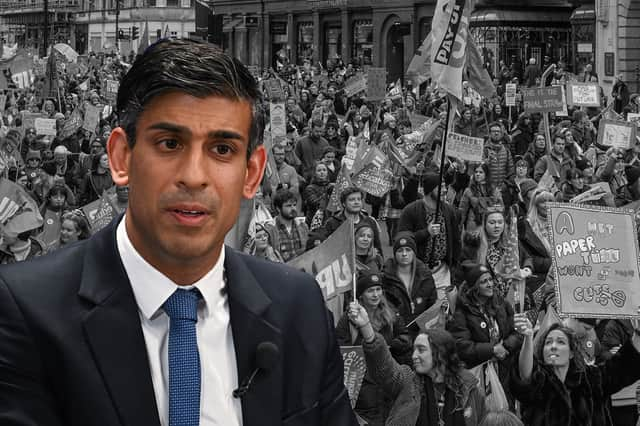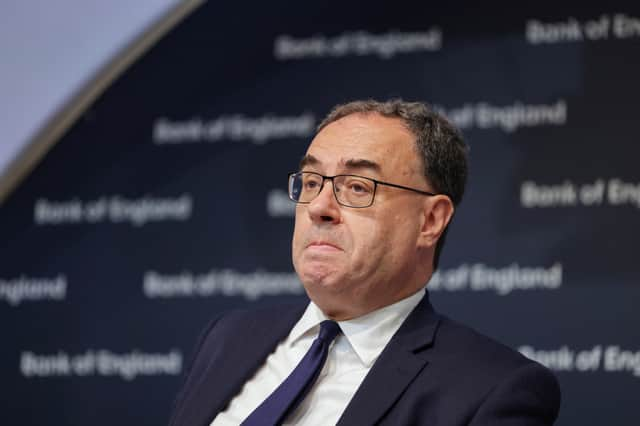Strikes: Rishi Sunak says 'government should not fuel fire by excessive borrowing' ahead of pay decision
and live on Freeview channel 276
Rishi Sunak was all smiles as he was photographed with Volodymyr Zelenskyy at the Nato summit in Lithuania.
However, as he heads back to the UK this evening (presumably on a private jet) the Prime Minister has much to ponder. Back in SW1, caterers have been busy preparing lamb shanks and a hog roast at Downing Street, for Conservative MPs to tuck into tonight.
Advertisement
Hide AdAdvertisement
Hide AdThe mood at the gathering however is likely to be dire, with Tories expecting losses in all three by-elections next week - and the bad news piling up. Sunak was given more mortgage headaches today, when the Bank of England said it expected almost a million people to have £500 added to their monthly payments over the next three years.
Before the by-election drama of next week the embattled Prime Minister will have to decide on what pay offer he will make to public sector workers still striking. Last week, the majority of state schools in England either restricted access to pupils or were fully closed due to an National Education Union strike.
And today, the NASUWT union - a separate teachers' union - has voted overwhelmingly in favour of industrial action, with nearly nine out of 10 teachers backing strikes.


Tomorrow, junior doctors will start a five-day strike in what could be the longest walkout of its kind in history. And as well as teachers and medics, Sunak has to think about pay rises for police, prison officers and the armed forces amongst others.
Advertisement
Hide AdAdvertisement
Hide AdThe Treasury has ruled out borrowing to fund pay rises, which means the Government faces the prospect of offering lower pay settlements than recommended by the pay review bodies or raiding department budgets – possibly cutting public services – to offer wage wises.
Government departments will get 2% from the Treasury, and Politico reports they have offered to bump this up to 3.5% with their own budgets, however that's a long way short of the reported 5% to 6.5% that pay agencies have recommended.
At the Nato summit, Sunak told reporters: “There’s three principles that are guiding us. We want to be fair, we want to do things that are affordable for the taxpayer and we need to be responsible.”
“The Chancellor is right to highlight the importance of excess government borrowing on inflation … the government has to act in a way that is responsible given the economic context that we face and in particular the rise in borrowing costs that most countries are currently experiencing.”
Advertisement
Hide AdAdvertisement
Hide AdHe added: “It’s absolutely vital we bring inflation down, government should not fuel the fire by excessive borrowing at a time when that would just make the situation worse.”
Unions will be forgiven for feeling exasperated at Sunak's comments. Hard-working teachers and doctors have suffered real-terms pay cuts for years, and now Sunak appears to be blaming them for inflation - which has become embedded in the UK economy.


He's echoing the words of Bank of England governor Andrew Bailey, who has frequently urged worker wage restraint to try and curb inflation. This ignores findings from the IMF that, in the Eurozone, corporate greed has been the main driver of inflation - and not everyday earnings.
Indeed the British Medical Association - the union of junior doctors who will start striking tomorrow - took a dim view of Sunak's comments. Prof Philip Banfield, BMA council chair, said: "Where the money to pay staff comes from is a political choice. When the Government says it cannot afford to pay doctors what they are worth, the question it should really be asking is whether it can afford not to? It is simply not out of this country’s price range to pay for the health of its population.
Advertisement
Hide AdAdvertisement
Hide Ad“We are clear that another real-terms cut this year - which is what the most recently speculated figures equate to - would be completely unacceptable to our members.”
And if Sunak does not give the recommended pay rise, the government will look incredibly hypocritical given last year ministers vehemently stuck to the recommendations, despite them being made before inflation skyrocketed.
Either way, with a series of NHS strikes this week, and train and London Underground walkouts next week - the industrial action shows no sign of abating. Sunak wants to be a Prime Minister who "gets on with the job", but if he fails to end the disputes voters will remember this at the ballot box.
Comment Guidelines
National World encourages reader discussion on our stories. User feedback, insights and back-and-forth exchanges add a rich layer of context to reporting. Please review our Community Guidelines before commenting.
